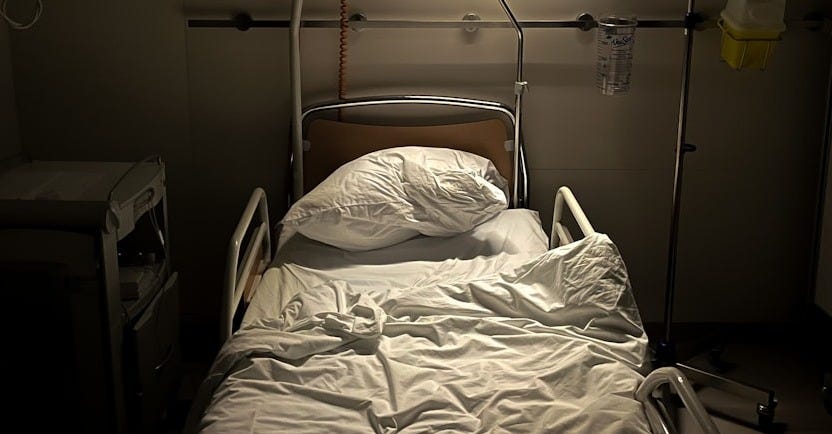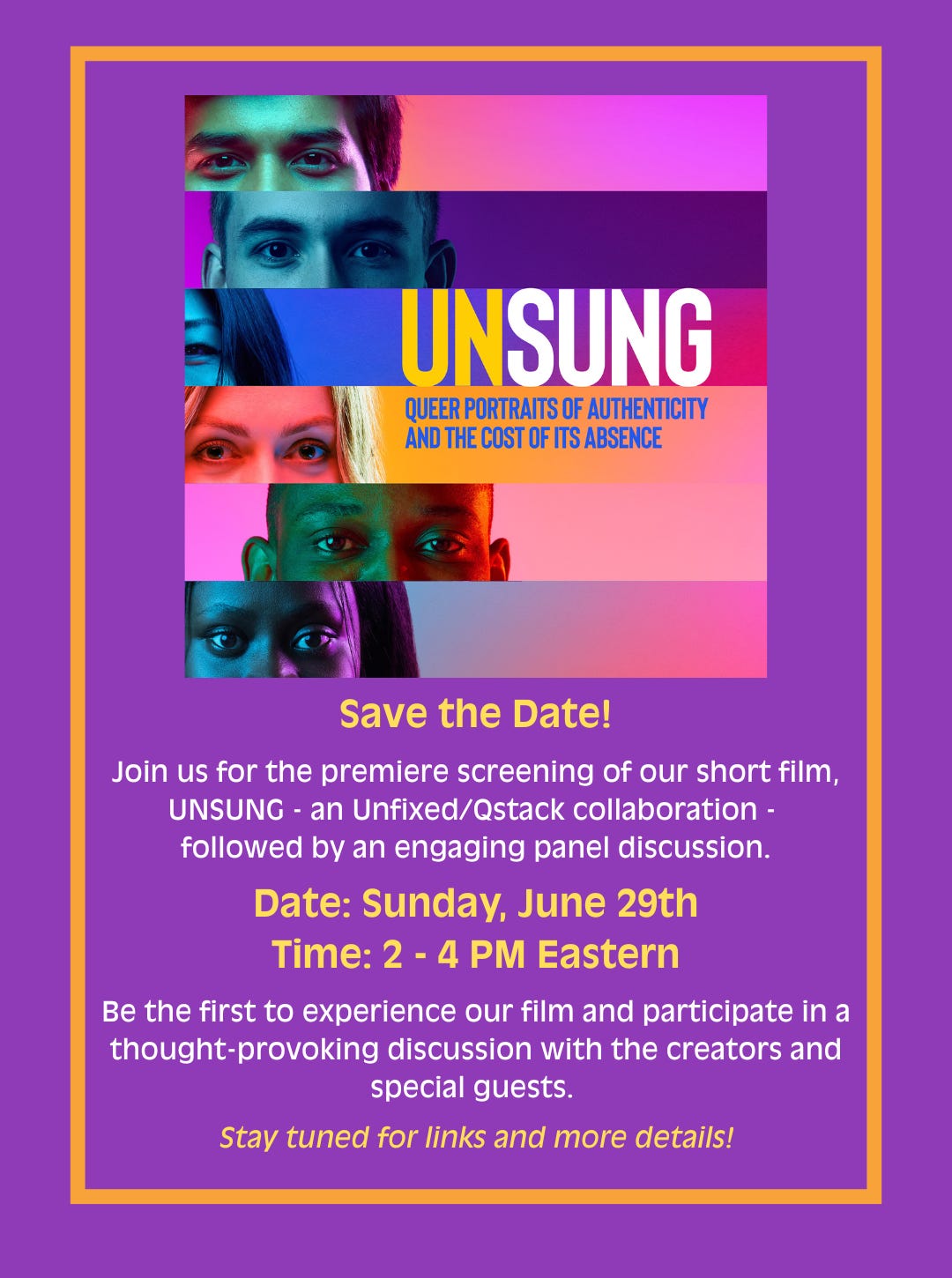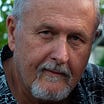
There was a call from the Emergency Department, alerting staff that a young gay man named Paul was being transferred up to the AIDS Ward within the hour. He’d been on a plane, travelling to Hawaii, connecting through San Francisco, when he had to be taken off because of sudden shortness of breath and onset of acute pain in his lower back. An ambulance had brought him from SFO directly to San Francisco General, and he was being processed downstairs in the ER. Another patient had been discharged earlier and the vacated room was getting readied. When Paul’s bed was rolled onto the unit with several doctors walking alongside, I could see he was extremely anxious. One of the interns was holding his hand and reassuring him as they all entered the room and closed the door behind them.
Several hours later I went to see him. He’d been travelling to Hawaii when half-way through the flight he’d become severely short of breath and they’d had to land in San Francisco. He was wearing an oxygen mask and was on pain medications for his lower back. He was very fearful, both about his difficulties breathing, but also because the staff had suggested that he contact his parents, which he really didn’t want to do. He lived in the Midwest somewhere and was not out to them, and told the medical team he needed to talk his boyfriend before deciding what to do.
I was visiting Paul the following day when his boyfriend Bill arrived, coming directly from the airport with his luggage. He was slightly older than Paul and very quiet and reticent. Paul’s back pain continued to be a problem and a volunteer massage therapist was working on him when a nurse came in and asked if I could contact the chaplaincy because a patient’s family wanted to see a Catholic priest. I told her I knew that Father Ken was on vacation and would not return for at least a week.
Bill looked at me and then hesitantly whispered, “I’m a priest.”
He said he could meet with the family if that was all right. I asked him if he felt he was up for it and he said it would make him feel useful. Bill reached into his suitcase and then stepped into Paul’s bathroom. When he came out he was wearing a black shirt, pants and a white collar. It was very moving to me, having been raised Catholic, to watch him lean over and put his hand on Paul’s cheek, saying he’d be right back. Paul took his oxygen mask off and they kissed.
Bill and I went down the hall to another patient’s room. I introduced him to Miguel and his parents and then went back to Paul, whose doctor was with him, saying he definitely had pneumocystis and was being treated with Pentamidine, which should make his breathing easier. She said they weren’t sure what the pain in his lower back was, and reiterated that the medical team felt strongly he should call his parents. He said he’d had several conversations with his partner Bill the night before, and they’d agreed it would be all right to let them know.
The doctor contacted his parents and told them Paul was in San Francisco, not Hawaii, that he was currently a patient at San Francisco General Hospital, that he was doing fine at the moment, but that his medical team felt they should come as soon as they were able.
Paul’s parents arrived the following day and the medical team was contacted immediately and took them in to see Paul. During the ten-minute meeting they found out that Paul was gay, that he and Bill, their family’s priest, were boyfriends, and that their son had AIDS. When I met Paul’s father in the corridor outside his son’s room, he was clearly shaken. He was as tall as I and his massive arms were crossed I front of him. I explained that I was one of the Shanti counselors on the unit and asked him how he was doing. He looked at me intently before saying that it was harder for him to find out his son was a fag than to hear that he was probably dying of AIDS. I looked at him and nodded, saying it must be very difficult for him to take all this information in at once.
It took almost two weeks for Paul to die. Every day his parents returned to the unit and whenever I visited with them, I tried as much as possible to have conversations that involved all four of them: Paul, his lover Bill, and his parents. Paul and Bill described how they met in a gay bar, and how sorry they were that they hadn’t come out to Paul’s parents sooner. We talked about AIDS and how San Franciscans were stepping up to help in powerful ways. Paul’s parents were definitely listening to what was being said and watching what was happening all around them.
Paul’s mom came into his room one morning, visibly shaken. She said a patient several doors down the hall had died and his mother was in the hall weeping. The room got very quiet and I asked Paul how he was doing. He said it frightened him to know what was happening just outside his door. His father leaned over and told him to not be afraid and I said it made total sense to me that Paul was scared. I asked his dad if it would be all right if Paul told us about his fears and the father sat back. Paul said he was so relieved and happy his parents were there, and that he and Bill had finally come out them. He was sure that they’d all be able to get closer now, and he was looking forward to that. His AIDS diagnosis, however, endangered that, and he was afraid he might die before they could understand and appreciate the beautiful relationship he and Bill had. Paul’s dad said they could see how much they cared for each other and the mother reached out and took her husband’s hand.
As the days passed, Paul’s parents were constantly watching the nurses, most of whom where lesbians and gay men, some with AIDS themselves, as they cared for their son, cleaned their son, comforted their son and lessened his pain as much as possible. He got sicker and sicker, weaker and weaker and I was on the unit the afternoon Paul died. I saw his father step out of his son’s room, weeping, and when he saw me, he moved quickly and hugged me.
“Oh! My boy is gone!” he moaned.
He was so big and his grief was so vast, I remember thinking we were both going to fall down. He kept repeating that his boy was gone and I cried with him.
The following day the parents returned to 5-A to gather Paul’s things. They thanked everyone for the love and care they had shown their son. Paul’s mother took me aside and said she was going to miss me. We’d had numerous conversations over the past few weeks and she said she’d come to a place of unconditional love for Paul and Bill and her husband. She added, smiling, that she and her husband had talked and she wanted me to know that they wished they could adopt me and bring me back to the Midwest with them.
We kept in touch for a while after they returned home. They were so grateful for the care that Paul had received and the kindness they had experienced on the unit and, in one of their last correspondences, they reported starting a support group for Parents of People with AIDS in their local church.
Bio: worked in the HIV/AIDS field from 1983 to 2022, is featured in the award-winning documentary “We Were Here,” and is currently working on a memoir. His writing has appeared in numerous publications, including Beyond Definition: New Writing from Gay and Lesbian San Francisco; The Bay Area Reporter; The National Library of Poetry; Rebel Yell: Gay Men of the South; The AIDS Reader; Queer and Catholic; Fray: Sex and Death; Christopher Street and The James White Review. He was nominated for a Pushcart Prize in 1996.








Dear Ed,
Thank you for much for your decades of service, compassion and caring. You are a gem!
Please continue writing your memoir as it makes real and poignant so many experiences.
I want to adopt you, too, Ed! <3